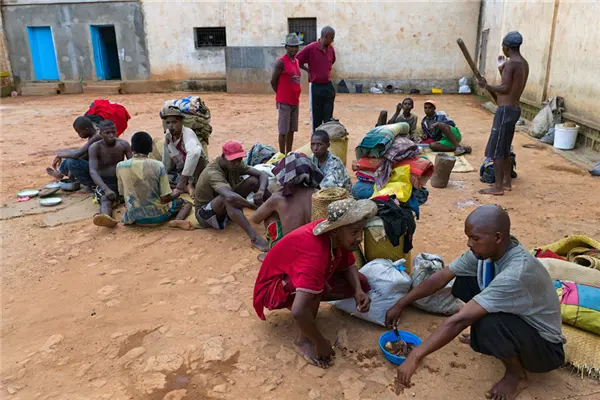Malnutrition in Madagascar's prisons is worrying with one of two prisoners in Madagascar is suffering from moderate or severe malnutrition, officials from the International Committee of the Red Cross (ICRC) said.
Since 2011, the ICRC has set up a program to fight against malnutrition in nearly half of the 42 prisons in Madagascar, identifying every year "extremely vulnerable malnourished within prisoners".
"Over 9,000 detainees were identified as malnourished and supported in 2015," the communication officer of ICRC office in Madagascar told Xinhua. "Approximately up to 30 percent of prisoners are already malnourished in custody," she added.
"Madagascar's government, hit hard by the economic crisis, has more and more difficulty to feed its approximately 22,000 inmates. The budget for the prison administration has dropped to about 70 percent since 2009 with a significant impact on the budget allocated to food for some 22,000 detainees," Narindra Rakotonanahary explained.
In its plan Madagascar's Ministry of Justice want to provide a daily individual ration of 750 grams of cassava, but actually it rarely exceeds 300 grams or less in some prisons.
Incarcerated since June 2015 into the prison of Toliara, 950 kilometers southwest of Antananarivo Madagascar's capital, Jacky Rambeloson suffered by malnutrition a month after his detention, "You die if you don't eat. This is what happens because we get so little to eat. And I can't stop thinking about my problems. So if there's no food either, it's certain death," he complained during a visit in June 2016.
Since June 2016, Jacky became very weak and was hospitalized in late June. Doctors suspected the presence of asymptomatic disease, hidden by his malnutrition.
"When my weight was normal, I never had any pain anywhere. But since December I'm always cold and I feel a tingling sensation all over my body. I quickly realized that I was losing weight," he said.
"It is completely insufficient, both quantitatively in terms of energy production and qualitatively," Brigitte Doppler, the ICRC nutritionist in charge of food program explained. "Prisoners should eat 750 grams per day but in Toliara prison, they get only 400," she added.
According to Doppler, "In the long term, if there is no other calorie intake, the inevitable outcome will be death."
Prison authorities of Madagascar recorded about 150 deaths in the prison population and more than two-thirds were related to malnutrition, more than fifty deaths in 2015, data from the Ministry of Justice showed.
"Besides food, poor access to medicines, the condition of a sick prisoner malnourished, already low, will get worse since he has no access to appropriate care," officials of ICRC talked also about "this very worrying situation for detainees' health."
"The poorest detainees, who don't receive food support provided by friends or family, are the worst off," ICRC officials disclosed.
"The families of inmates often live far from prisons, and are themselves poor and come only rarely or not at all," ICRC officials added.
The southwest part of Madagascar is among the most affected by drought, where 380,000 people were affected in 2015, the poverty rate exceeds the national average and more than 50 percent of municipalities are experiencing alarming vulnerability in the southwestern region, data from the United Nations World Food Program (WFP) said.
(APD)
 简体中文
简体中文

